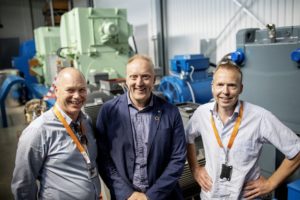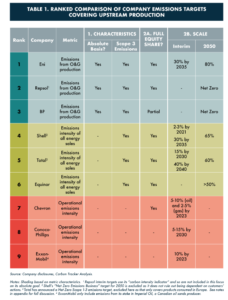Wärtsilä, Repsol, and Knutsen to test ammonia four-stroke engine
By Trevor Brown on July 01, 2020

This week, engine manufacturer Wärtsilä announced “the world’s first long term, full-scale, testing of ammonia as a fuel in a marine four-stroke combustion engine.”
The project will begin in the first quarter of 2021, at the Sustainable Energy Catapult Centre’s testing facilities at Stord, Norway. It is supported by a NOK 20 million (USD 2 million) grant from the Norwegian Research Council.
“We need to develop and use new technologies that reduce emissions. We are very happy to support development work that can lead to increased use of ammonia as a fuel in shipping and in the offshore sector. Know-how from this project will also provide important input to the development of regulations for the use of ammonia and other low-carbon fuels,” says Tina Bru, Norwegian Minister of Petroleum and Energy.
Ammonia is promising as a carbon-free fuel for marine applications, in view of the maritime industry’s need to fulfil the International Maritime Organisation’s vision of reducing greenhouse gas emissions from shipping by at least 50 percent by 2050. Furthermore, ammonia has huge potential for providing green energy to remote power systems, such as offshore installations on the Norwegian Continental Shelf.
Wärtsilä announcement, World’s first full scale ammonia engine test – an important step towards carbon free shipping, June 30, 2020
Only a few months ago, in April 2020, we reported that Wärtsilä Tests Internal Combustion of Ammonia, following the announcement of initial ammonia engine testing that “yielded promising results.” With the clear focus in this latest announcement on both decarbonizing shipping and also decarbonizing offshore power systems, Wärtsilä is establishing its explicit interest in using ammonia as a fuel in both markets: maritime and power.
“We are really excited to further develop and understand the combustion properties of ammonia as a carbon free fuel in one of our multi-fuel engines”, says Egil Hystad, General Manager, Market Innovation at Wärtsilä Marine Business.
“Ammonia storage and supply systems will be designed and developed for maximum personal safety, and in parallel with the Fuel Gas Handling System under development as part of the EU project ShipFC.”
Wärtsilä announcement, World’s first full scale ammonia engine test – an important step towards carbon free shipping, June 30, 2020
We have also written about the ShipFC project, when it was announced in January 2020, describing plans for Eidesvik / Equinor’s North Sea supply vessel Viking Energy to be retrofit for ammonia fuel in 2024. On the Viking Energy, Wärtsilä will be responsible for “power technology and ammonia storage and distribution systems,” working to install and integrate Prototech’s 2 MW solid oxide fuel cell on the vessel.
The full-scale fuel testing programme can pave the way for ammonia engines to be used in real vessel operations within few years, and several shipowners have shown interest in this possibility. It will also provide important insights into the long-term effect of an ammonia fuelled engine in relation to other systems and components in a vessel, including the required safety measures.
Wärtsilä announcement, World’s first full scale ammonia engine test – an important step towards carbon free shipping, June 30, 2020
One of Wärtsilä’s partners on this project is Knutsen OAS Shipping, part of the Knutsen Group, which describes itself as “a fully integrated shipping company with operation, newbuilding supervision, chartering and project development in-house.” It operates LNG and bulk chemical tankers.
The other project partner is Repsol, the Spanish oil and gas producer.
Repsol
Although the announcement contains no details on the role of each company in the project, Repsol is a very interesting partner for Wärtsilä from an ammonia energy perspective.

Of all the large oil and gas producers, Repsol is one of the few that has adopted an aggressive decarbonization strategy that approaches consistency with the Paris Agreement.
According to a report published last week by independent climate risk analysts Carbon Tracker Initiative, Absolute Impact: Why oil majors’ climate ambitions fall short of Paris limits, Repsol aims to reach net zero emissions by 2050, on an absolute basis, including the carbon contained in its end products (Scope 3 emissions).
Only two weeks ago, Repsol announced a major step into green hydrogen production and synthetic fuel marketing. It intends to invest EUR 60 million to build a fuel production facility based on green hydrogen, near the port of Bilbao.
This way, Repsol continues to take decisive steps to lead the energy transition and towards the goal of becoming a net zero emissions company by 2050 …
The first project, in which 60 million euros [USD 67 million] will initially be invested, involves building one of the largest net zero emissions synthetic fuel production plants in the world, based on green hydrogen generated with renewable energy …
The facility, which will be fully operational within four years, will set a new benchmark in Europe … and it will position Repsol on the leading edge of the development of net zero emissions fuels.
Repsol announcement, Repsol to develop two major emissions-reductions projects in Spain, June 15, 2020
This plant will make synthetic hydrocarbon fuels, combining green hydrogen with captured CO2 from the nearby Petronor refinery. The target market for these low-carbon hydrocarbons is the existing hydrocarbon fuel market: “automobiles in Spain and the rest of the world, as well as in airplanes, trucks, and other machinery.”
The Petronor refinery “has integrated the process of capture, storage, and use of CO2, and it is expected to be able to capture the CO2 directly from the air.” These two technologies (fossil CO2 capture and atmospheric CO2 capture) reduce but cannot eliminate the carbon emissions from either Petronor’s refinery products or the Repsol Technology Lab’s fuels.
To go further — to reach net zero — Repsol must move beyond synthetic hydrocarbons to synthetic molecules: hydrogen itself, or ammonia.
The fact that Repsol is now partnering with Wärtsilä on ammonia engine tests demonstrates its awareness of and interest in these carbon-free synthetic molecules.